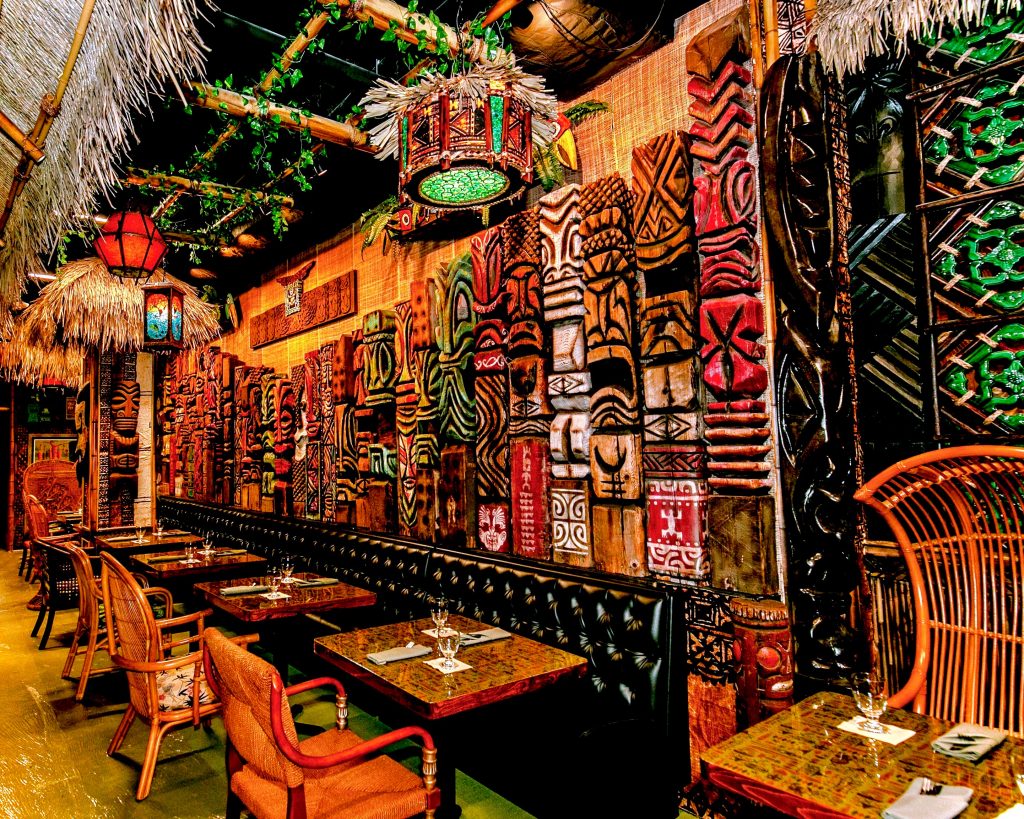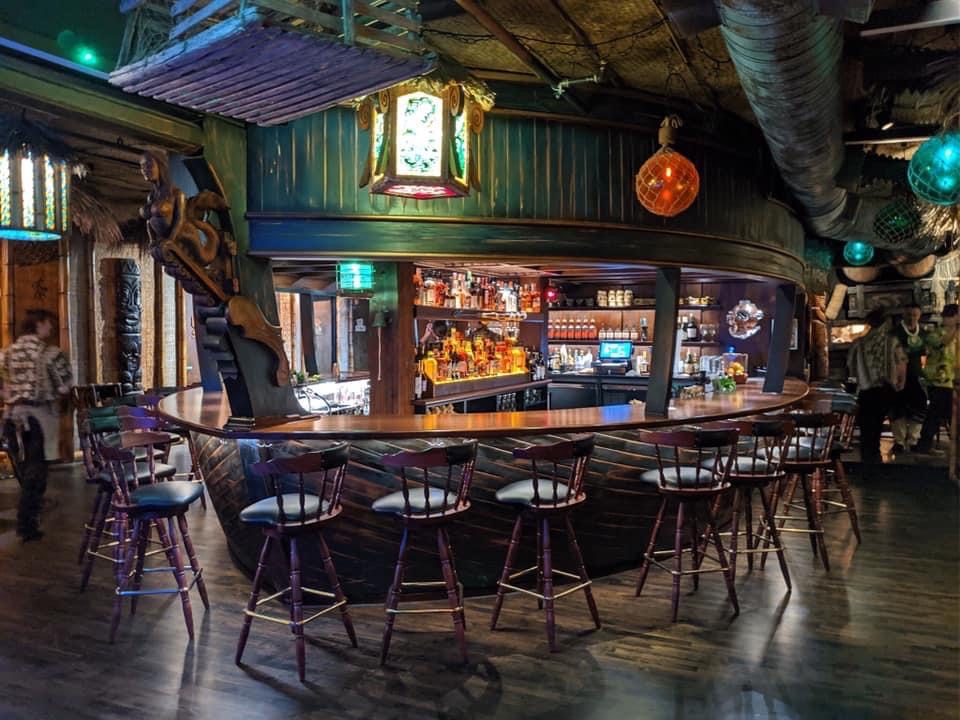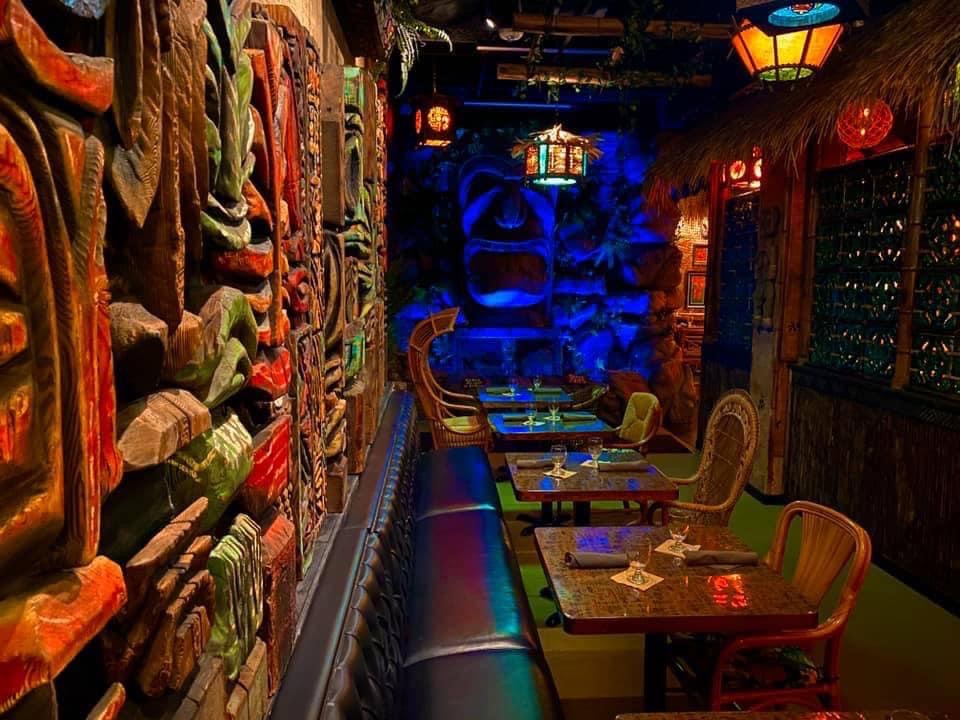
Editor’s note: This feature was written before Gov. Gretchen Whitmer’s latest restrictions regarding dine-in service.
The challenges of running a new business usually do not include a three-month shutdown due to a major public health crisis.
But for downtown tiki bar Max’s South Seas Hideaway, featured last spring in Grand Rapids Magazine’s 2020 dining awards as one of nine new restaurants to visit, that was just the case. The result was a serious disruption to Max’s efforts to grow its business during its early stages.
Despite being able to reopen in June, the struggles have persisted and led to an unordinary circumstance: Max’s just celebrated its first anniversary in October but also filed for bankruptcy earlier this month. And with the pandemic set to stick around, the future remains uncertain.
Max’s spoke to GRM to look back — and forward — at the fate of the business in the time of COVID-19.
Creating Max’s
Max’s opened in October 2019, about 4½ months before Michigan’s COVID-19 lockdown began. Grand Rapids restaurateur and bar owner Mark Sellers partnered with Martin Cate, owner of other tiki bars in San Francisco, San Diego, Portland and Chicago, to open the business.
“He and I knew each other just from being interested in tiki stuff,” Sellers said. “I was here (in Grand Rapids), and I had the world’s largest collection of tiki artifacts. I called him up and said, ‘Hey, let’s partner on a place.’”
Hawaii-based tiki and Polynesian artist Gecko joined Sellers and Cate in partnering to create Max’s. The tropical-themed bar and restaurant boasts several features, including an aquarium, a bar shaped like a ship, and a full display of modern and vintage tiki art from Sellers’ collection, much of it from old Trader Vic’s restaurants.

Sellers added that many of the artifacts were thrown away when those older restaurants were torn down in the 1970s. Collectors, “sometimes literally dumpster-diving to get them,” salvaged the pieces. When a large collection went up for sale at a 2017 auction in Los Angeles, Sellers bought nearly all of it and brought it home to Grand Rapids, where the art became a significant part of the Max’s environment.
“When you walk into Max’s, it’s like walking into a tiki museum,” Sellers said.
Prior to shutting down in compliance with Gov. Gretchen Whitmer’s executive orders in March, Max’s enjoyed a successful opening and post-launch operation. Max’s general manager Jim Schramm said the response from the Grand Rapids community “blew me away.”
“The trajectory that we were on prior to the shutdown was really good,” he said. “We felt that five months into it, we were really hitting our stride in terms of operating efficiency and group morale, and (our) culture was really starting to develop. We really felt like we were in a good place before the shutdown.
“It was definitely a disappointment to have all that come to a screeching halt.”
Sellers echoed the sentiment.
“Grand Rapids embraced us, and we did really well for the first four months. Then, right at the beginning of March, things started to slow down as people started to get spooked by this weird virus they didn’t know anything about.”
‘Lockdown mode’
Shortly thereafter, businesses across the state shut down to counteract the spread of COVID-19. For Max’s, the combination of being a new business and a primarily indoor experience made the blow especially severe.
“We were still trying to pay off some of the startup costs from our opening,” Sellers said. “And we’re not a place like Domino’s Pizza or Chipotle, where we’re doing much carryout or delivery, so our sales basically fell to zero, almost, for three months.”
He said Max’s did what it could to get by during that time, furloughing many employees and starting a to-go service, but added the to-go service didn’t make up for the missed experience of being inside the restaurant.
“We basically went into lockdown mode,” Sellers said.

Schramm said this ordeal has been one of the more difficult times in his 20-year restaurant career. He started at Max’s as an assistant general manager before opening and took over as general manager two weeks before the shutdown.
“In the beginning, nobody knew how long the shutdown was going to last, so it was scrambling to make ends meet and scrape for whatever we could get,” he said.
In addition to carryout, the restaurant also experimented with delivery but encountered additional challenges with companies like DoorDash, which charge fees for their services. Sellers said it made it possible to make sales, but not profits, because on top of the labor and other costs for every order there was a nearly 40% fee to the delivery company.
One small but positive change did help Max’s recover some of its sales. In July, Michigan passed a law allowing bars and restaurants to sell cocktails to-go.
“It did help slightly,” Sellers said. “It took them three months to do it, but it was a nice move. Instead of our sales being down 90%, they were down 80% after that. And we’re still doing it.”
Reopening and celebrating one year
In June, Michigan restaurants were permitted to reopen at 50% capacity with strict sanitation and mask-wearing protocols.
“The reopening process was challenging,” Schramm said. “But fortunately, we have a strong group of staff that stuck with us that was ready to come back. So, we were fortunate in that regard to have a lot of staff that opened the restaurant with us, understood our processes and what our culture is.”
Once Max’s did reopen, the challenges shifted toward maintaining COVID-19 protocols for both staff and guests.
“(It was) really monitoring our staff and their health, both physically and mentally, on a daily basis, trying to provide them work in a safe environment,” Schramm said. “The shift from the normal day-to-day of managing a restaurant, which isn’t an easy task, to compounding that with, literally every day, having to have conversations or protocols in place related to COVID has definitely been a challenge.”
But even amid all of these obstacles, reopening initially provided a substantial boost for Max’s. Sellers said the restaurant had about 14 weeks of increasing sales until a drop-off in mid-October.
“We’ll be able to make it until next spring, probably. But if the virus is still around next summer, all bets are off. I don’t know if we can make it past next April or May.”
Mark Sellers
It was an exciting time for Max’s, he said, as more business meant more hours and more money for employees. But with sales falling again, Sellers said he is “getting a little less optimistic.”
Still, recent events have not all been negative for Max’s. About a month ago, on Oct. 17, it celebrated its first anniversary with a day of cocktail specials and the unveiling of a new tiki mug designed by Michigan artist Doug P’Gosh and produced in Max’s in-house ceramic studio. Schramm said turnout for the event was high.
“We really saw a lot of people come out and help us celebrate,” Schramm said. “It was a chance for us to look back and reflect on all of the obstacles we’ve overcome to still be here.”

An uncertain future
Despite the relative success of the summer reopening, the pandemic continues to take its toll on Max’s business. Limited to 50% capacity, Sellers said the restaurant was managing to break even but not profit.
The strain of operating in such a limited way prompted Sellers to file for Chapter 11 bankruptcy as a protective move meant to allow Max’s more time to pay back the vendors and creditors it owes. The action extends Max’s window for paying off its debts by three years.
In the meantime, the business will do what it can to keep operating. Because doing delivery was not profitable, Max’s stopped offering it after reopening but now will resume the service.
“Even if we just make two cents on every dollar of sales, it’s two cents more than what we would make,” Sellers said. “And if we can break even on delivery, at least we can keep some of our employees working if we get shut down again.”
That possibility has Sellers “pretty worried,” though he said another lockdown is necessary to control the spread of the virus. But the lack of expanded unemployment benefits for workers and stimulus aid for restaurants remains a problem.
“I feel like there’s no safety net for people if there’s another shutdown,” he said.
Schramm said Max’s is ready for the transition if it comes to that.
“I can say we’d be a lot more prepared for it this time around,” he said. “A lot of what we do is total immersion inside the restaurant, so we never focused on takeout or delivery before we shut down. We were forced into it, so now, if we have to shut down again, we’re much more prepared for that.”
Beyond restaurants, Sellers also expressed concern for hotels, live music venues and movie theaters — all businesses that bring people out to eat and drink.
“All of those things are going against us right now,” he said. “It’s like the worst headwind I could ever even imagine. I couldn’t even have a nightmare that was that bad. The worst part of it is we don’t have any control over our own destiny.”
Sellers said the only way he could exert some control over that destiny was the Chapter 11 filing. The three-year extension will allow Max’s time to continue navigating the pandemic without as much pressure to make payments it cannot currently afford to make.
But right now, three years is the long term. Sellers said his main concern is the months ahead.
“We’ll be able to make it until next spring, probably,” he said. “But if the virus is still around next summer, all bets are off. I don’t know if we can make it past next April or May.”
For now, Max’s will continue to offer dine-in, carryout, delivery and cocktails to-go, as well as sell its merchandise online. Community members can support the restaurant in all of these ways. Reservations, merchandise and general information about Max’s are available at maxstiki.com.
Sellers said the Grand Rapids community already has been supportive.
“Most people have been tipping when they get takeout food, which didn’t use to ever happen,” he said. “People have expressed a lot of support for the plight that restaurants are going through. So yeah, I think people have been great.”







Facebook Comments